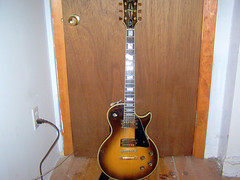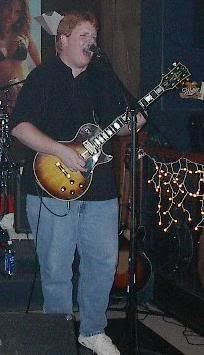He was an excellent guitar player. He played country early in his career and then mostly jazz. His most recognizable recordings are with his former wife, Mary Ford, as well as his own band, The Les Paul Trio.
All that aside though, he literally invented modern music from the recording point of view. The story goes that he was always a tinkerer. He built an electric guitar for himself out of a railroad tie. It was the world's first solid body guitar. That in itself revolutionized everything as, when he teamed up with Gibson to manufacture their Les Paul series of guitars, it eliminated much of the extraneous noise produced by the early electric guitars, it allowed guitarists a seemingly endless amount of sustain (that is the duration of a note. Early electric guitars couldn't hold onto a note for very long), and it eliminated a lot of the horrible feedback early electrics produced. It's not hard to extend those innovations to their logical conclusion: Jimmy Page, Jeff Beck, and Eric Clapton all destroying the ear drums of legions of Rock and Roll fans while playing Les Pauls in The Yardbirds, Led Zeppelin, The Jeff Beck Group, and Cream. Jimi Hendrix stands as the missing link in that chain. He mostly used Fender guitars, Gibson's primary competition in the market. He was rarely seen playing a Les Paul (pictures do exist though) but those Stratocasters were still solid bodies. Even the Strat and the Tele owe a debt to Les Paul.
Again, the invention of the solid body electric guitar alone could make Les Paul a legend in the music industry... but he topped that in a major way.
The story continues that Bing Crosby gave him a tape recorder. A single track, mono, reel to reel tape deck. He took that machine and started messing with it. He developed new techniques and invented new hardware that turned the music industry on it's head.
Les Paul and Mary Ford released records where Ford can be heard singing harmony... with herself. Paul could be heard playing two separate guitar parts at the same time. That was revolutionary. It was, frankly, impossible. How could one voice be heard singing along with itself? Magic? Nope. Multi-tracking. I think he initially used two machines. He would record a take of the song on one machine, then he would record the playback along with another take onto the second machine. Eventually this lead to having more than one record head on the tape machine. That way they could record one take onto a strip of the magnetic tape, then rewind and record another take onto a separate strip of the tape while listening to the first strip.
He did other things with a tape recorder that may seem simple now, but at the time were stunning. How did he play so fast? How did he play notes that were higher than the guitar's pitch range? Simple, he changed the speed of the tape. High end tape recorders offered two tape speeds. 15 inches per second and 7.5 inches per second. (Or was it 32 ips and 15 ips. I am going to look like a total buffoon if those numbers are inaccurate. It's been a loooong time, but I am pretty sure I have them right. Let's just say for the sake of this post that it was 15 and 7.5) The faster the tape moves across the record head, the higher the quality of the recording. Professional recording engineers used 15 ips. However, music is math. If you divide the speed of the recording in half (15/2=7.5) you also divide the tempo of the recorded music in half. You also cut the frequency of the music in half. It's not common knowledge, but if you divide the frequency of a note in half you lower the pitch by one octave. So Les would record his band at 15 ips and then record himself playing at 7.5 ips. The tempo of the music would be half of the original recording, but the music would be in the same key, one octave lower. When his 7.5 ips recording was played at the normal 15 ips it would sound as if he were playing twice as fast as he actually did and the picthes would be one octave higher than they actually were. In real terms, he was able to play notes that were higher than his guitar could physically reach, and at a blinding speed.
There is one other innovation that can't be left unmentioned. Les Paul figured out a way to separate the record head and the playback head on the tape machine. He put them in different places. He then would take the playback from one track and record it onto a second track. Because the two heads were in different places there was a delay between the playing and the recording. The result? Tape echo. Hugely ground breaking. It was an electronic way to produce an echo. Brilliant. It opened the door for a seemingly infinite number of electronic effects, none of witch sound any better than Les's tape echo.
Put it simply: The recording industry we have today would not exist without Les Paul. He is a giant. He is a legend. Rest in Peace Les Paul.
Now for my stupid pictures of Gibson Les Paul guitars.
This is the second Les Paul I've owned. The first was a Les Paul Deluxe that was stolen from my car in 1990. Even though this one is a custom and much higher quality, I am still crushed over the loss of my Deluxe. It was awesome.

This picture is from the recent Break Even reunion. There were three guitar players playing that day. All three were playing Les Pauls. I had my custom, Steve had his standard, and Tim played an Epiphone copy. Epiphone used to be a high end guitar maker but at some point in the past Gibson bought them and turned them into low end Gibson product line. "Low end" in this case being relative, as an Epiphone still kicks the ass out of just about any other guitar.

Finally, a shot of me playing my Les Paul... probably poorly, but it can't be any worse than my singing.

No comments:
Post a Comment